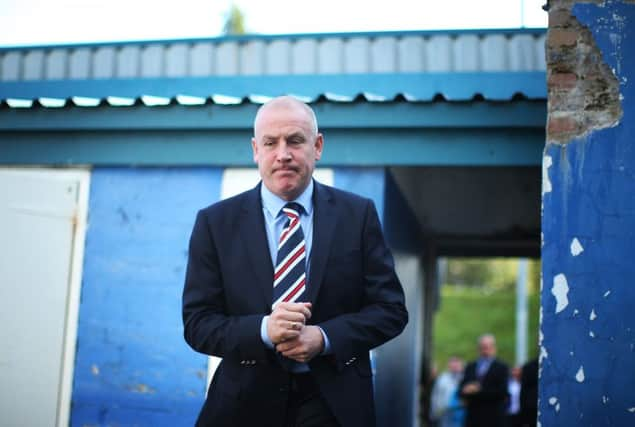Mark Warburton: short contracts keep Rangers players hungry


Warburton, the former city trader, invokes bankers in a supportive fashion to back up his belief that giving shorter contracts that are constantly reviewed can be the method to keep players pushing to do better.
Bankers’ conduct became a discussion point for Warburton when he was asked to explain the thinking behind the decision to give attacker Barrie McKay only a one-year extension. The 22-year-old has been a central performer for Rangers this season, and will be one of those asked to provide the spark against Queen of the South in Dumfries this afternoon. Yet, a 12-month deal was all that was offered to him only weeks after Andy Halliday and Jason Holt were signed up until 2020.
Advertisement
Hide AdAdvertisement
Hide AdThere are no certainties where Rangers will be playing next season – even as the Premiership appears to be looming large for the Championship leaders. There are no certainties as to how the Ibrox club will continue to finance the loss-making operation at the club further down the line. Warburton maintains that McKay’s contract is a business decision.


“I personally think every player’s different. Shorter deals sometimes maintain the hunger of a player,” he said. “Whenever you sign a player – and I’m not talking about Barry or Andy or Jason – whenever you sign a player you never know in the back of your mind… they may never be better than they are now. That’s the fact of it. This may be the best they are ever going to be, or they could be world beaters in a year’s time. That’s the nature of the game we’re involved in. So you’ve got to try and make informed judgments and decisions on players.
“But I think the club’s job should be, if the player impresses, then he should never have to knock on the door. You call him in, that’s what you should do.
“I look at the players down south, when we were at Brentford we had the backing of the owner at Brentford. We were calling the boys in every six months to improve their terms because they were doing well and improving themselves at a high level. They gained promotion and we rewarded them; top six in the Championship and we rewarded them; maintaining top six and rewarding them. That type of incentive worked very well. They knew if they performed well then they would be looked after. It kept them hungry and focused.
“That to me was far more beneficial than someone who has four, five years under their belt and sits there almost smoking a cigar, so to speak. It’s just my opinion. I understand people will look at value. But I think from my point of view I want the players to be hungry. I want them to be here and to maintain standards. I want them to maintain the hunger. But they’ve also got to know you will reward them. If you go with a shorter-term deal then they’ve got to feel confident in the knowledge that you will reward them if they do well.


“You incentivise the players and it’s performance based. If you’re doing well then you’ll be looked after. I’m always going back to the City, the bankers always got criticised. ‘This banker got a seven-figure bonus, that’s not right.’ Yet, he’s made $10 million for the bank. So if you pay him a million dollars as an employee then that’s the bank $9m better off. Why would you not give him seven figures?
“That guy going to work has made a $10m profit. Why wouldn’t you, as an employer, not agree to pay that employee a seven-figure bonus – it’s 10 per cent of what he’s made. So the incentive is there to make you drive and drive. The more you earned the more you got. Why can’t that be the same with points and goal difference, why can’t it be?
“I’m not a fan when you walk into a squad and you see players on different appearance levels. How does that work? You and I both play 90 minutes and you get one amount and I get half. How does that work? There are things you can do and that helps with unity and harmony. If someone is getting double for the same performance it can’t promote good unity in the dressing room. I’m a big fan [of players getting the same] and that has to be phased in over a period of time because of existing contracts.
Advertisement
Hide AdAdvertisement
Hide Ad“I know there’s one or two big investment banks down south who used to have a flat rate salary for everyone and they made their money via the bonus. You only made good money, as such, if you delivered a profit. That to me is great. If you come into work every day and you know that if you do well then you’ll get rewarded, well, that’s a great culture to have. What’s wrong with that?”